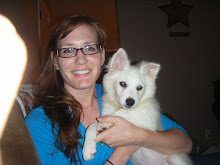
This is a picture of my father-in-law, Mark, giving me a goofy look at my husband's birthday party a year and a half ago. At this time, we did not think he was an unhealthy man, however, about 6 months after this picture was taken, he began having some scary symptoms, chest pain, nausea, dizziness...etc. Luckily, my mother-in-law who is an RN, had drilled into his head the importance of not ignoring the signs of heart attack. Mark, only 52 years old at the time ended up having triple bypass surgery. His Left Coronary Artery (known as the widow maker) was 90% occluded and he had 2 other blockages that were almost as severe. We have thanked God for the last year that he gave Mark warning signs. I cringe at the thought of what would have happened to him without those warning signs.
The Ferguson family has poor family history. Mark's mother died at the age of 52 from what they think now was a heart attack. His father did not live to be much older than 60-65 when he died from complications from heart disease and diabetes. From discussing this with my in-laws, the Ferguson's were active people and not overweight. Mark was raised on a farm and reports to eating a lot of country, home cooking (lots of meat, potatoes, but also a lot of produce). We know that disease prevention takes more than simply being active and not overweight, however to be only 52??.....I often think about how many people I know who eat just like this, but were not cursed with Mark's genetics. (And my husband wonders why I am so particular about what I "encourage" him to eat?)
Nutrigenomics is, to explain it simply, the study of how nutrition impacts our genetics. Individuals respond in varying ways to the different nutrients in foods. Some people who were raised on the exact same foods as Mark, may never have heart disease, others may not ever be diagnosed with health problems until much later in life. We have known all along that nutrition is not "one size fits all." Everyone is different and will require a different nutrition regimen to optimize their health. This is what nutrigenomics is all about. The human genome is 99.9% identical, meaning your genetic makeup is 99.9% identical to all other humans. It is in that 0.1% that our genes differ. The hope is that nutrigenomics research will be able to identify the differences among a healthy person's and an unhealthy (disease stricken) person's genome. Once scientists identify these genetic differences, which researchers have identified some, they begin to reserach how different dietary factors, such as more fruits & vegetables, omega 3 fatty acids, or even how lifestyle factors such as alcohol consumption, exercise, or cigarette smoking, impact the expression of our genes. We are all born with a particular genetic potential, however environmental factors impact how our genes will be expressed, or in other words, the outcome of our health.
Nutrigenomics shows a lot of promise for the future in being able to personalize nutrition recommendations based on an individuals genetic potential of developing disease. We will hopefully be able to optimize one's health and prevent disease by recommending a specific eating regimen. (Getting our patients and clients to comply to our recommendations is a whole different challenge.) At this point, even though several genes have been identified as genes of interest, there are many more genes that have not yet been identified and much more research needs to be conducted on how nutrition impacts our gene expression. We have a long way to go before we will be able to actually apply nutrigenomics research to nutrition counseling.
I think that this topic holds an opportunity for RDs to gain knowledge and further show their value in healthcare and disease prevention. This opportunity will be what we make of it and what we put into it. One fear I have is that another profession will claim nutrigenomics as its own and that RDs will miss out on this opportunity. I think to prevent this, we need to be teaching basic nutrigenomics in undergrad and encouraging students to go this route after graduation from undergrad. Another worry that individuals have on this topic is that if a genetic test reveals that they have a higher risk for disease development, insurance companies will reject them. I think this is a logical worry, however, maybe this fear will help motivate people to live healthier lives in the future.
I am excited about this new topic, nutrigenomics, and hope that applicable recommendations will follow its research on ways to really help my patients and even friends and family prevent heart disease and live longer and healthier lives. I know that this probably will come after my time as a dietitian. However, I hope that I am wrong and that research in nutrigenomics moves along at a fast pace and surprises me!

